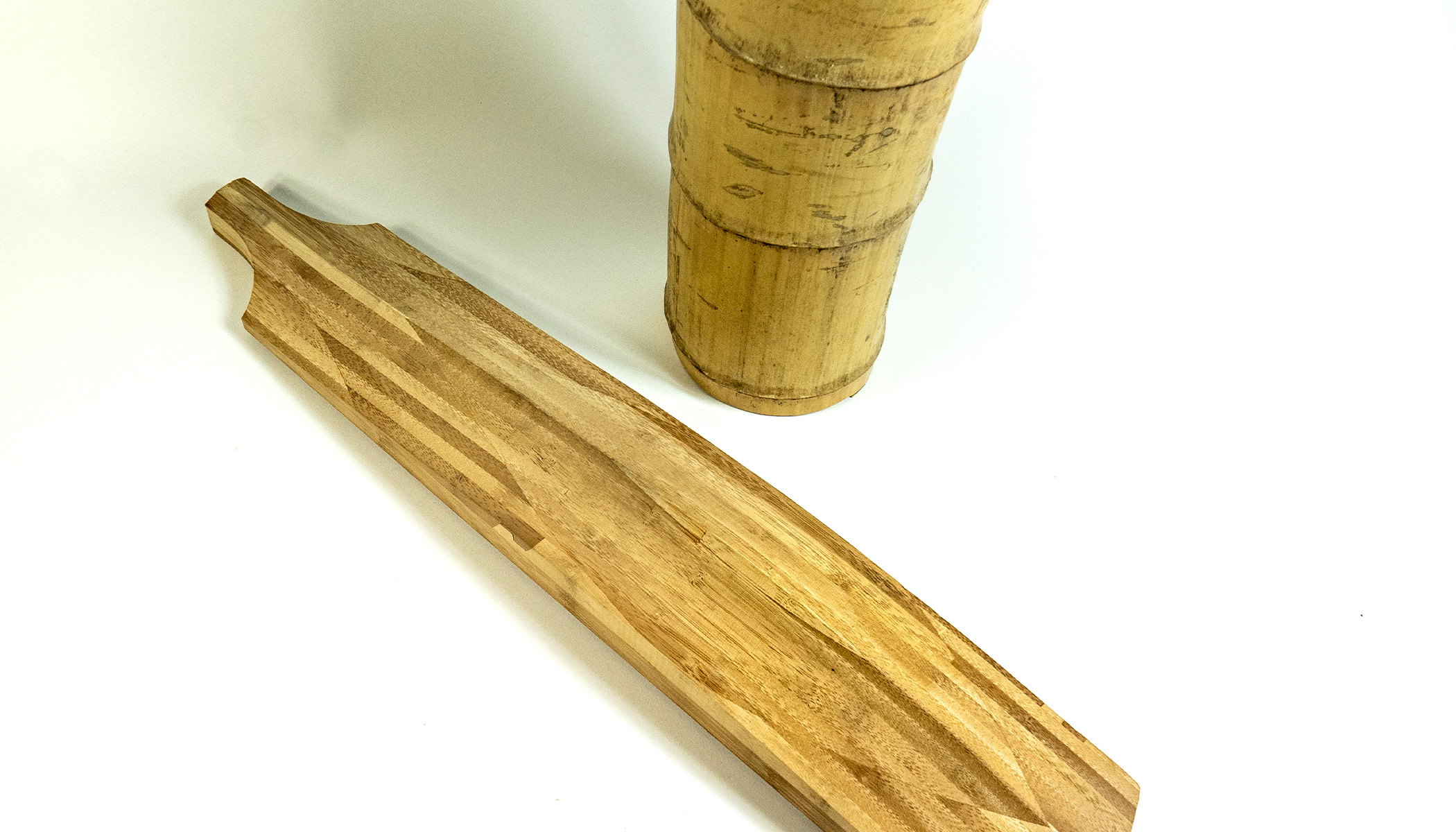A cricket bat with a blade
Made from engineered bamboo, providing good stiffness, surface hardness, energy transfer, a larger sweet spot area, and good vibration performance.
This innovative bat combines its high-performance properties with the sustainable credentials which derive from fast growing and widespread bamboo.
Technology overview
Over 300 million people worldwide regularly play cricket, the majority in low-and-middle-income countries. To produce a typical bat, willow grown in England (of which there is a well-known shortage) is shipped and processed in craft hubs in South-Asia.
Design and material innovation of cricket bats will be critical in improving the reach and sustainability of the sport, especially with the latest innovations in the game’s format and more inclusive and diverse player demographics. Sustainability is a key trend in sports equipment and a movement within the sport and sensitivity to sustainable sourcing and ethical supply chains is embedded in younger players.
Benefits
- Bamboo matures twice as fast as willow, reducing the environmental impact and promoting sustainability
- Reduced wastage (bamboo has a lower incidence of natural defects than willow)
- An ethical alternative by supporting lower-income countries
- Larger and more effective sweet spot: Our prototype bamboo bat features a sweet spot that performs 19% better than that of a traditional willow bat.
Comparable comfort and feel: bamboo’s similar ‘damping ratio’ to willow ensures that players experience the same level of comfort and vibration absorption when striking the ball.
Opportunity
We are committed to enhancing the game of cricket while promoting sustainable practices and minimising environmental impact. Our bamboo cricket bats represent a significant leap forward in cricket bat technology, and we look forward to partnering with leading bat manufacturers to usher in a new era of cricket excellence. With the right partners, we can embrace both tradition and innovation to push forward a brighter, greener and more inclusive and accessible future for the sport.
Inventors
Dr Darshil U. Shah
Associate Professor in Construction and Materials
As a senior researcher within the Centre for Natural Material Innovation, Dr Darshil Shah works with scientists across disciplines on developing biomaterials, such as engineered wood, bamboo and natural fibre composites, as lightweight, sustainable, and structural alternatives to conventional materials for various application sectors, including wind energy, construction, transport, health care, and consumer products. Darshil specialises in natural materials science and technology. Combining sustainability with performance and functionality in natural materials is a major driver of his research. Prior to working at Cambridge, Darshil did post-doctoral research on silk-based and biological composites at the University of Oxford’s Silk Group (Dept. of Zoology, 2013-2014), and obtained his PhD on developing plant fibre composites for wind energy applications at the University of Nottingham’s Composite Research Group (Faculty of Engineering, 2009-2013).
Ben Tinkler Davis
Ben is a Cambridge University graduate who holds a Masters in Engineering, with a specialization in Aerospace and Materials. Following his academic achievements, he embarked on a career as a Design and Aerothermal Engineer at Arrival (ARVL), a dynamic UK-based electric vehicle start-up. His role at Arrival revolved around designing high-fidelity modelling techniques and incorporating consumer feedback to optimize automotive designs. Ben was drawn to this role by his passion for envisioning a more sustainable future for a broader audience.
Post Arrival, Ben pursued a Master of Science in Finance at Johns Hopkins University in the United States. His academic journey at Johns Hopkins was marked by notable achievements, including leading his team to the Global Semi-Finals of the CFA Research Competition, surpassing hundreds of other competing teams along the way.
Enquiry for Bamboo cricket bat
Tags: Bamboo cricket bat, cricket, Sport, sustainability




